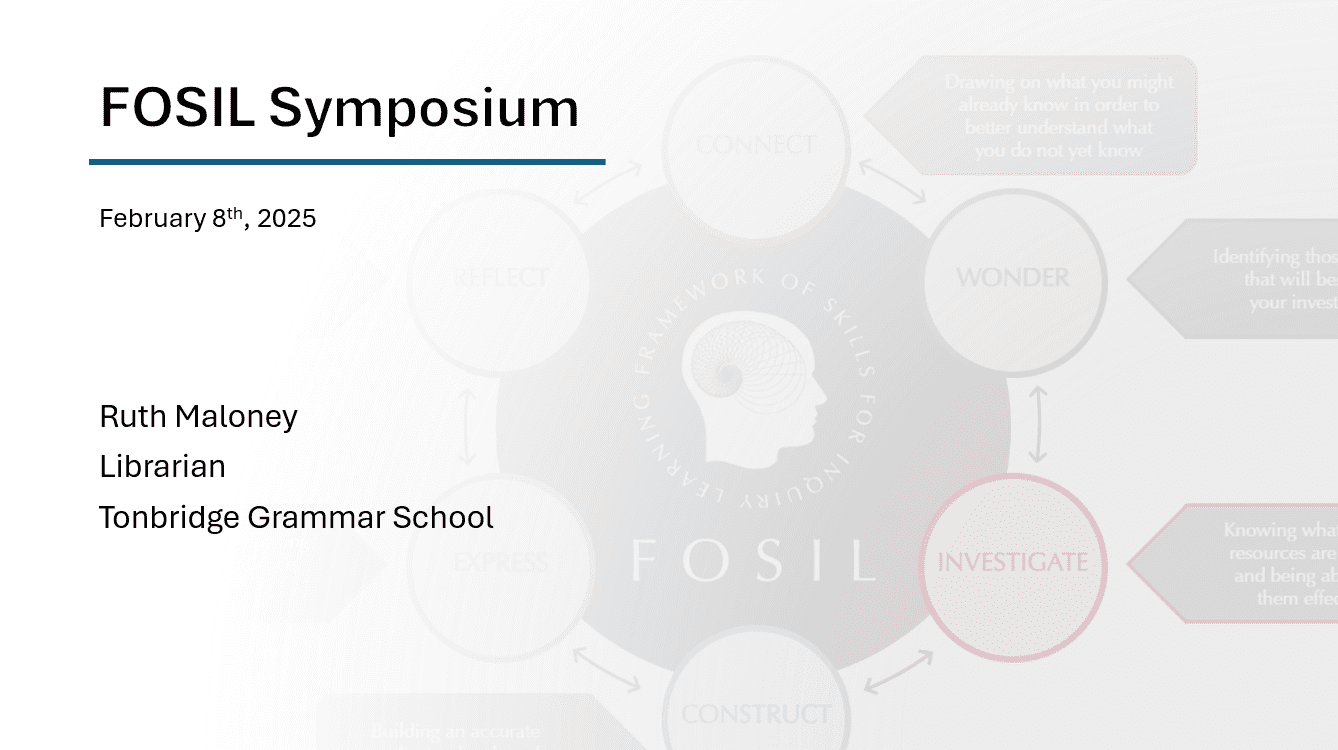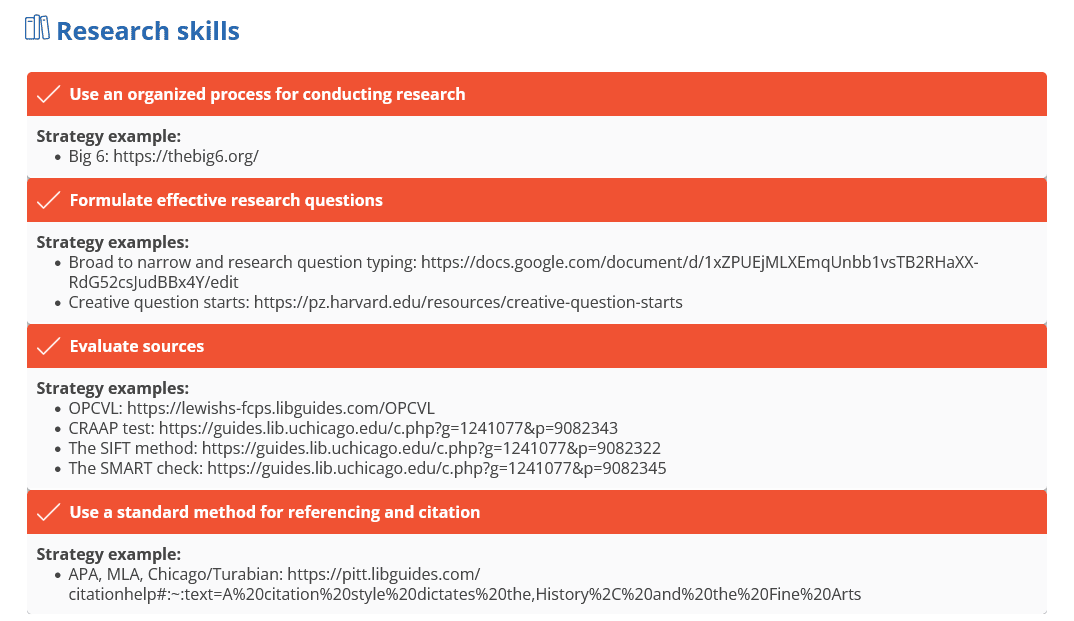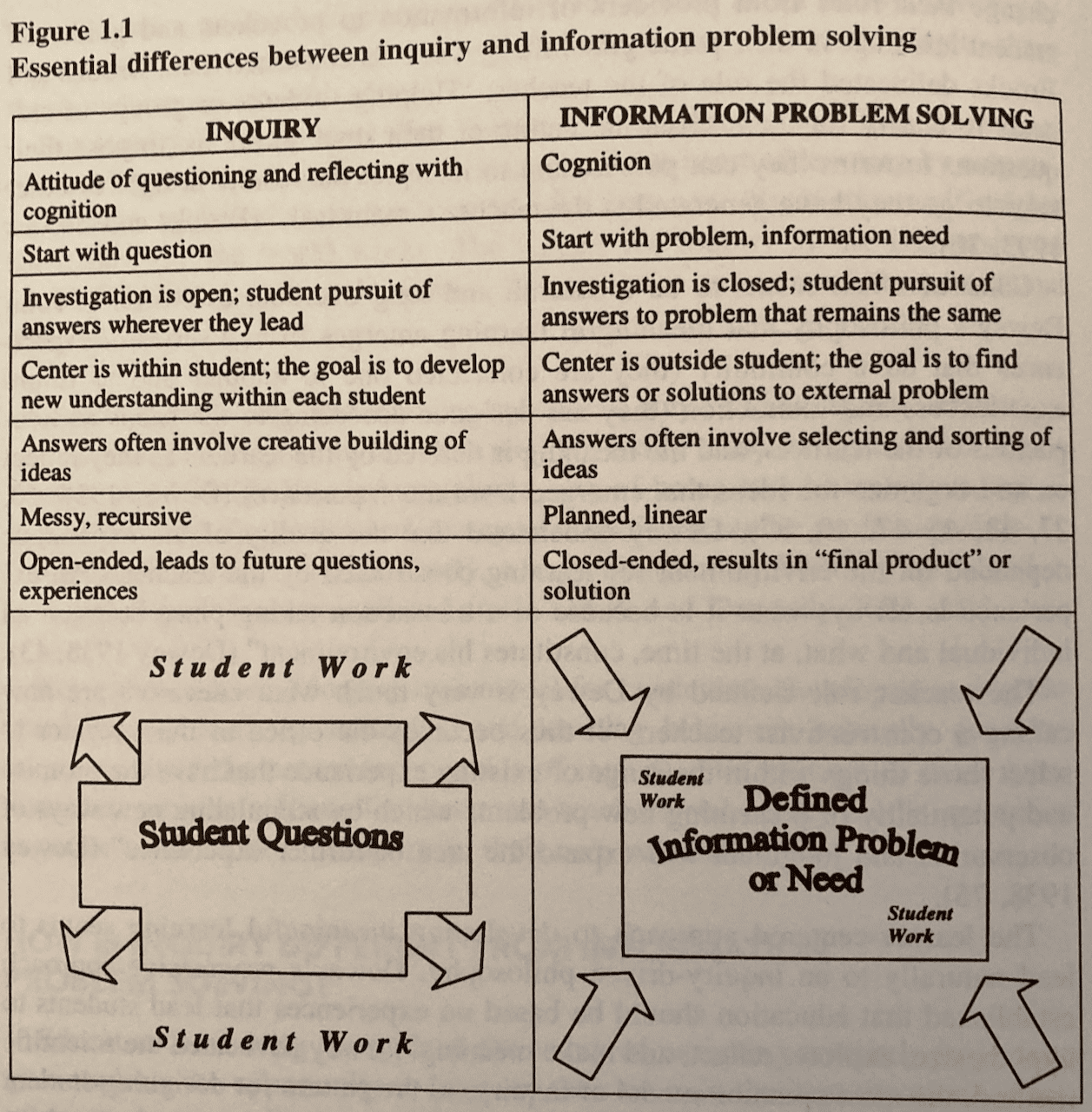Session 3a: Ruth Maloney (Tonbridge Grammar School)
Home › Forums › FOSIL Presentations › 2025 FOSIL Symposium › Session 3a: Ruth Maloney (Tonbridge Grammar School)
- This topic has 4 replies, 3 voices, and was last updated 1 year ago by
 Ruth.
Ruth.
-
AuthorPosts
-
10th February 2025 at 1:50 am #85466
Post here for questions and comments on:
12:45 – 13:30 | The revolution will not be televised | Ruth Maloney, Librarian at Tonbridge Grammar School
—
Links to PowerPoint presentation and YouTube recording.
—
 14th February 2025 at 12:27 pm #85566
14th February 2025 at 12:27 pm #85566For those who were interested in the IB ATL mapping project I have just spent and interesting hour with our MYP Coordinator looking at the BETA Enhanced MYP (available here https://pds.ibo.org/Prototype10MYPBeta-EN/#/menu/6716088b3cda1e4028a382f4 if you have My IB login). It seems to be a sensible simplification of the program including a pairing down of ATLs.
Those ATLs now listed under Research are only as shown in the attached screenshot and provide a brilliant space for FOSIL in place of the ‘The Big 6’. I wonder if we can work with the IBO to make this change?
Our MYP co-ordinator is really excited by these changes and by the opportunity to use FOSIL at this stage. I feel slightly nervous, and maybe someone can help me, in thinking that putting the FOSIL cycle inside an ATL called Research is the wrong way round. I am not sure this is entirely clear, my thinking feels fuzzy on this but I think that research is part of Inquiry and I feel uneasy about the order of things here.
 15th February 2025 at 12:27 pm #85570
15th February 2025 at 12:27 pm #85570Thank you for posting this, Ruth, which appears to be an encouraging development, and I have taken the liberty of adding your image to your post for ease of reference.
This is one of the frustrations that I had with the IB Diploma Programe (IBDP), and then the Middle Years Programme (IBMYP), before we left Oakham.
As Anthony Tilke (2011, p. 5) points out, “inquiry, as a curriculum stance, pervades all [IB] Programmes,” so why not (1) use a robust model of the inquiry process, and then (2) locate the desired inquiry skills within the appropriate stages of the inquiry process? Which is what Barbara did, and on of the main reasons why based FOSIL on her models and framework of skills – this makes the world of difference to both teaching the skills and learning with the skills.
Moreover, as the IB (2019, p. 9) points, “Libraries are where most forms of inquiry, not just academic ones, begin…and the librarian is responsible for energizing and maintaining the inquiry process. Ideally, the librarian is trained in many ways of creating conditions for inquiry within and beyond the classroom … Inquiry is more expansive than research, and facilitating it requires expertise beyond research methods (Callison, 2015 and Levitov, 2016).” It is, in my opinion, confusing and unhelpful to make this distinction so clearly in one place, and then then to blur that distinction elsewhere.
What transformed the IBDP Extended Essay (EE) for us at Oakham, which we had 13 years of experience with, for both teachers and students, was viewing and approaching the EE as an inquiry process rather than a research process. The main difference was that we moved almost immediately from requiring students to start with questions, which they then narrowly attempted to answer, to students starting with a topic that they then investigated/ researched, in order to formulate a question that emerged from their investigation/ research and the evidence that they had uncovered.
I would not hesitate to use FOSIL (or any other legitimate model of the inquiry process), in place of the Big6 (or any other research/ information problem solving model), even if, as you rightly rightly point out, it gets things the wrong way round, because it is an opportunity that the IB has given you to actually do things the right way round. Perhaps broader change is possible, and an opportunity exists for a revolutionary school to take the lead in this.
The choice of the Big6 as an example is an interesting, because it is an information problem solving process rather than an inquiry process – Barbara addressed this distinction in How is Inquiry Different From Information Problem Solving, in her chapter on Inquiry-Based Learning, in Curriculum Connections Through the Library (2003, pp. 4-6).
The differences are summarised in the following table (p. 6) – note that the starting question in inquiry is not the same as the final/ formal question that emerges from the investigation:

Also, like most/ all information problem solving/ research process models, it appears that the Big6 is no longer being actively developed and supported, and is/ was proprietary. This reflects the broader shift from research process models to inquiry process models – see, for example, the first (2002) and second (2015) editions of the IFLA School Library Guidelines – and means that it is unlikely that schools adopting it will be part of a vital, supportive community of inquiry/ practice.
References
- IBO. (2019). Ideal libraries: A guide for schools. Cardiff: International Baccalaureate Organisation.
- Stripling, B. K., & Hughes-Hassell, S. (Eds.). (2003). Curriculum Connections Through the Library. Westport, CT: Libraries Unlimited.
- Tilke, A. (2011). The International Baccalaureate Diploma Program and the School Library: Inquiry-Based Education. Santa Barbara: Libraries Unlimited.
16th February 2025 at 2:06 pm #85594Hi Ruth,
I’m with you both here – let’s get FOSIL in there and THEN get them to reverse the order. Just think if over time you could persuade them to call this skillset “Inquiry Skills” and give FOSIL as an example of “An organised process for conducting an inquiry”… While they are using fuzzy language here, we are all on a journey and have to start where we find ourselves. After all, the first iteration of FOSIL (many years ago) was “Framework for Oakham School Information Literacy“. We have come a very long way in our understanding of inquiry since then, arriving at the Framework Of Skills for Inquiry Learning, but if Darryl hadn’t started out looking for an information literacy model we would never have arrived at an inquiry model. The IB are interested in the research process, so work with them to show them that inquiry gives them the model they need and so much more besides.
On a separate note, I’ve been thinking since last week about your excellent Sixth Form inquiry focussing on Investigate that tried to slow them down and stop them jumping to conclusions. You said that they struggled with the idea of no concrete Express phase and I wondered if you could give them an Express that didn’t focus on conclusions. How about imagining they are a reference librarian or perhaps a parliamentary researcher, and their job isn’t to find an answer to the question (or even necessarily to find the question) but to collect a balanced set of reputable resources that address their topic from a range of angles to allow the client to draw their own conclusions? This way they have a concrete product that explicitly precludes drawing conclusions. They could produce a briefing paper/leaflet/poster for their client that summarises the main areas of argument and gives resources for further study for each. (Briefing paper might be the wrong phrase here as those usually propose solutions I think, and we don’t want them to do that. I’m not sure what the correct phrase would be).
What you are doing sounds like such an excellent idea, I think you were saying that it just needs some focus for the students so they know what they are aiming for at the end.
20th February 2025 at 9:13 am #85597Thank you both for your thoughtful and thought provoking replies.
I will tackle the IB, this is BETA testing after all and the IB inspectors who visited us for our 5 year review were certainly interested in FOSIL. Maybe Matt Rose and I can make a start and other IB Librarians can join us. If there is anyone else working with he MYP who would be interested in pursuing this with the IBO do say. I might start a fresh post on the Forum so that this is seen more widely and we can collate material and comments in one place. Darryl, have you ever managed to have any productive conversations with the IB about this, Anthony Tilke was the leader of my Level 3 IB training and I found him to be very open, I don’t think I’ve seen him here? Is he engaged with FOSIL?
Darryl, it is to try and resolve the same approach to the EE that you discussed that I decided to run the induction project. We have cohort after cohort who seek answers rather than taking a stance of wonder. I am sure that we can support this long term by making alterations lower down the school but this push at the start of year 12 seems like a necessary intervention particularly after GCSE.
Jenny, thank you so much. The idea of asking the students to become parliamentary researchers is excellent. I suspect we might even have a parent who could come and speak to them about this work, they will find it far easier to focus with that approach. The UK government has some excellent material produced by the Knowledge Exchange Unit available on their website. I take your point about the issue of briefing papers proposing a solution but I also remember carrying out research for lawyers as a Legal Librarians, often we were asked to find information, broad and reliable, from which the lawyers would draw conclusions. It is this open and curious research that I am hoping for and I think if I can design a research proforma which will provide a space for students to showcase their results then I will have a new focus for this project.
I might consider grouping them by subject area and asking them to present. I am keen to find an element of oracy practice in this project, part of my difficulty is the shear number of students, we do not have time to hear them all individually. Potentially we could ask them to present to parents at the sixth form open evening. This could take the form of an exhibition with parents primed with a selection of questions pulling in form the skills we want students to have developed or concerning the resources we want them to use. Another possibility might be through their ToK lessons, to use that opportunity to question their research.
-
AuthorPosts
- You must be logged in to reply to this topic.



